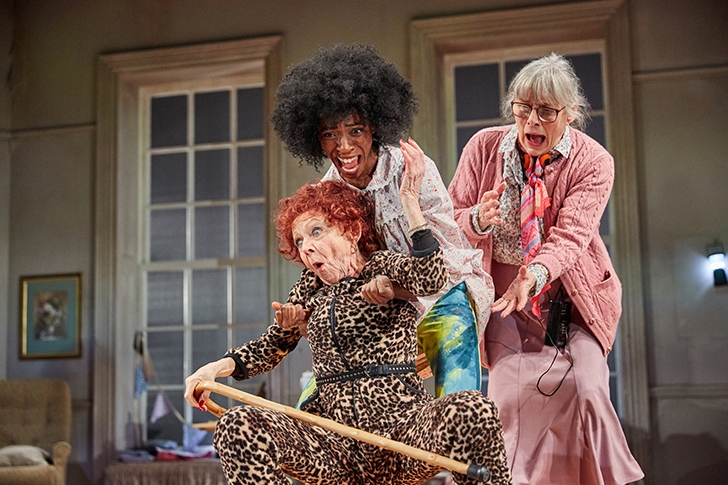Sandi Toksvig’s new play opens in a Gravesend care home where five grannies and a temporary nurse are threatened by rising floodwaters. In Act One the ladies prepare for a rescue party that fails to materialise. In Act Two they build a life raft out of plastic bottles. There’s a bizarre sequence involving a silly young burglar who gets beaten up and flung through a window by a woman of 71. The ending is more of a petering out than a conclusion. All the characters feel interchangeable apart from the nurse, who claims to come from Cheltenham. Her name, Hope Daly, prompts one of the old dears to quip. ‘My life in a nutshell.’ Later Hope admits, ‘I’m from Croydon, OK? I don’t tell people because I don’t need the pity.’
The play’s great virtue is its mood of lyrical whimsicality. ‘I love a homosexual, they’re so clean,’ says one of the dears. ‘I was the first in our village to get a mobile phone. I knitted it a cover.’ Ms Toksvig perfectly understands the cultural mindset of her audience and she shamelessly flatters all their quirks and prejudices. She’s aiming for the Radio 4 demographic: middle-aged, nostalgic, feminine, educated but anti-intellectual, utterly English and cosily snobbish. To these people the only part of the world that matters is the Home Counties. Northerners are poor, surly and amusing. Foreigners are quaint or dangerous. Or a bit of both. ‘I know she was Polish but otherwise she looked harmless.’ Anyone brought up on a south London estate, like Hope, is regarded as the victim of a prank in rather questionable taste.
The play’s second act is darkened by passages of macabre reminiscence with one of the grannies admitting that she facilitated her husband’s death and another regretting that she gave birth to ‘three little sods. I used to look at them and think of all the things I hadn’t done.’ But the snag here, and it’s a considerable one, is that the story doesn’t develop. The characters, who are simply mouthpieces or collections of prejudices, are incapable of growth, redemption, self-discovery or any of the emotional conversions that a properly realised personality can undergo. So it’s like watching five sitcoms on the trot, or lunching on strawberry trifle and chocolate biscuits. You leave stuffed but dissatisfied. A few unfair critics have monstered the show because Ms Toksvig lacks the full complement of writerly skills. But those she has she deploys like a virtuoso.
The Listening Room by Harriet Madeley is a verbatim piece about criminals who meet their victims. We hear from a rootless thug who enjoys cruising the streets at night, heavily armed, and attacking random strangers. He got four years for clubbing a tipsy commuter over the head with a baseball bat. The blow dislodged several of the victim’s teeth and nearly killed him. Asked how he felt afterwards, the thug said, ‘Hungry.’ Later he admitted that violence elated him. But he was intelligent. In prison he took to reading and acquired enough self-knowledge to turn himself from a violent parasite into an asset to society. At their meeting, his victim conceives a liking for his attacker. ‘If he hadn’t been a Muslim I’d have bought him a drink.’ A more harrowing case involves a young paramedic killed for fun by feral teenagers. The lad who threw the first punch intended harm, rather than murder, but was found guilty of homicide. For 11 years the parents of the victim clung to their rage because it was the only vestige of sentiment that connected them with their extinguished child. They hated their anger but couldn’t relinquish it. Finally, they met the initiator of the assault and praised his courage in agreeing to the encounter. ‘I was a 15-year-old coward and I murdered your son,’ were his first words. This cathartic confession dissolved their anger and enabled them to feel the beginnings of respect and even cordiality towards him. Now out of jail, the killer is settled, educated, employed, and a father himself. At Christmas he receives messages of goodwill from his victim’s parents, who regard his children as a blessing in which they share, an emblem of their forgiveness and humanity.
Anyone with an interest in drama should see this show because it delivers all the perfections great theatre aims for. Playwrights will watch it with a mixture of wonder and despair. I doubt if there’s a writer alive who could recreate the range of emotions this play lays on. It drags the audience to the very limits of human endurance and demonstrates how far a personality can sink and what horrors it can tolerate and survive. You emerge with your consciousness altered, your conception of human beings elevated and amplified. Which is the goal of great drama. A painful, shocking, vital, uplifting experience. Quite unforgettable.







Comments